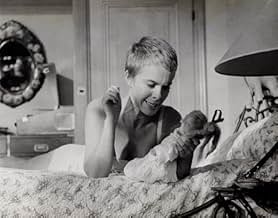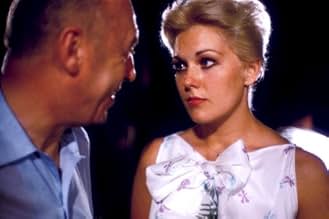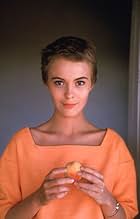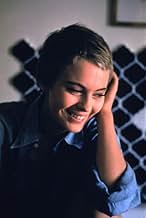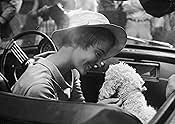IMDb RATING
6.8/10
6.1K
YOUR RATING
Spoiled Cecile, 17, spends her summer at the French Riviera with her rich, widower, playboy dad and Elsa. Anne, her late mom's friend, visits and brings changes to all.Spoiled Cecile, 17, spends her summer at the French Riviera with her rich, widower, playboy dad and Elsa. Anne, her late mom's friend, visits and brings changes to all.Spoiled Cecile, 17, spends her summer at the French Riviera with her rich, widower, playboy dad and Elsa. Anne, her late mom's friend, visits and brings changes to all.
- Nominated for 1 BAFTA Award
- 2 nominations total
Tutte Lemkow
- Pierre Schube
- (uncredited)
Maryse Martin
- Undetermined Secondary Role
- (uncredited)
Edouard F. Médard
- Bit part
- (uncredited)
Jackie Raynal
- Dancer
- (uncredited)
- Director
- Writers
- All cast & crew
- Production, box office & more at IMDbPro
Featured reviews
A fascinating, frustrating, though ultimately deeply satisfying film. Many readers have commented on the frustrations, and they are hard to deny. My experience of this movie goes back to the early 70s, when I first encountered it in ideal circumstances, at the Museum of Modern Art during its complete Preminger retrospective, and in a gorgeous, perfect print. A great introduction to a film whose very meaning resides in its glossy surface. The first few minutes of the film powerfully set up the tragedy that is to come: Saul Bass's dripping teardrop titles underscored with Auric's deeply tragic music, followed by the first black and white scenes depicting Cecile's current active but deeply disengaged life. Then, as Cecile arrives home and begins remembering "last summer", the blue Mediterranean sea begins to invade the frame, little by little -- a striking effect, to say the least --, we are there, in the midst of a carefree vacation with Cecile, Raymond and Elsa, and quite successfully invited to forget the tragedy that seems to be in the making and enter a carefree, sunlit world where nothing, seemingly, could ever go wrong. Masterful film-making, and, thus far, perfectly pitched: Seberg's perfectly expressionless and beautiful face has no small part in making it work. That she is less secure in the flashback scenes is unfortunate, but her physical presence at least gives the right signs: this is a very young girl, happy but extremely shallow. (Yes, I will admit that the line readings are quite stiff -- no question she is "acting." But, if one is already in the proper frame of mind they are not all that damaging.) What's important is the holiday mood, and the performances of Niven and Mylene Demongeot are sufficiently effervescent to evoke it. (Demongeot is a real charmer -- beautiful beyond belief and full of joie de vivre.) The arrival of Deborah Kerr on the scene changes all this: a dignified Lady coming into the midst of a world she finds immoral, distasteful and, in the deepest sense, unacceptable: her reaction to realizing that Raymond is, shall we say, shacking up with Elsa is the turning point of the film, the crossroads of comedy and tragedy. And from this point we are invited to see how, step by step, comedy turns to tragedy. What's most wonderful about this film is how diverting that progression is. The world of the French Riviera is, after all, a world of carefree bliss (at least on the surface), and we are given ample opportunity to enjoy that along with the characters in the film: a delightful casino scene (enlivened by the presence of that wonderful actor, Walter Chiari, a truly handsome man with a wonderful flair for comedy, and here, playing opposite Demongeot, particularly delightful) and a visually stunning dance at the dock, a masterpiece of costume design in delicious color and Cinemascope, worthy of a Minnelli musical (and, in its delirious scale, surpassing most of them). Finally, let me just say that the final moments of the film (and I will refrain from spoiling them) are among the most moving in all cinema: an evocation of self-loathing and emptiness that remains unrivaled in its beauty. Yes, beauty. Caveat emptor: It is useless to see this film in the pan&scan version (I have had the experience, and it is horrible). The Columbia DVD edition looks great (absolutely NO extras, by the way; it appears to have been simply dumped on the market -- odd treatment of a masterpiece). Oh, yes, my title heading: Preminger's previous films had mostly dealt with "little" events -- noirs, small comedies, etc.; most of his subsequent films ("Exodus," "The Cardinal," "Advise and Consent," "In Harms Way") with Big Events. This one is still on an intimate scale, but has much in common visually (particularly the masterful use of CinemaScope, to which Preminger took like a fish to water) with the later films.
Wealthy playboy father and his precocious seventeen-year old daughter share a sassy, flirty relationship with one another while teasing and leading-on potential romantic partners for both. But the fun and games are called to a halt once dad is reunited with an old friend of the family, a chic fashion designer who would like to see both father and daughter get serious about their lives. Talented writer Arthur Laurents adapted his screenplay from Françoise Sagan's book, yet even with Otto Preminger directing a classy cast, this soaper set on the Riviera never comes to a boil. Preminger sees the idle rich as spoiled and decadent, dancing away mindlessly into the night, yet the players (David Niven and gamine Jean Seberg as father and daughter, Deborah Kerr as Niven's fiancée) bring a lot more heart and human interest to the piece than was probably intended. As such, the characters are more embraceable than the writing and handling, and portions of the film are puzzling or awkward. Still, film-lovers of this era in cinema will no doubt bask in the lush surroundings, not to mention in the enjoyable performances and beautiful photography (black-and-white for the present day, color for the past). The script might have benefited from more honesty in the finale--the 'irony' in bringing these dead-end lives full circle isn't very cutting--and there are two supporting characters who are given the shaft by Laurents. There are certainly pleasures to be had here, however, most notably in the scenes between Kerr and Seberg. **1/2 from ****
A good-for-nothing, unhappy high society girl recalls a summer when she destroyed the love of her rich playboy father and his respectable bride, because she was afraid of finishing their hedonistic lifestyle.
Well-acted, starry cast and very graciously made but, in atmosphere, oddly faithless adaptation of a sharply cynical novel, which tends to glamorize and ennoble its originally unlovable characters against luxurious backgrounds. It holds the interest, however, and the glossily colorful photography of the sunlit French Rivera in the past alternating with the bleakly black and white present, is particularly excellent.
Well-acted, starry cast and very graciously made but, in atmosphere, oddly faithless adaptation of a sharply cynical novel, which tends to glamorize and ennoble its originally unlovable characters against luxurious backgrounds. It holds the interest, however, and the glossily colorful photography of the sunlit French Rivera in the past alternating with the bleakly black and white present, is particularly excellent.
Jean Seberg is an absolute joy. I just wanna give her a big fat hug and kiss... well that's just two things anyway. What makes Otto Preminger's film so wonderful is that Seberg is the right age to play the part of a spoiled rich girl coming of age. Also the film is given an authenticity and heart because it was written by Françoise Sagan when she was the same age as Cecile (Seberg). That's right, this amazing and brilliant work was penned by a 17-year old.
The plot is fairly standard. A young girl living with her playboy father becomes jealous of his new love and when marriage is proposed she does her best to break it up. Gee nothing remarkable there. What is remarkable is the characters and their relationships. They have an extra amount of depth and the situation between Cecile and her father, Raymond (David Niven) borders on the incestuous. This gives it an added dimension and depth when Anne (Deborah Kerr) threatens to "steal" her father away. Another place where it avoids clichés is dealing with Anne. Kerr plays her magnificently and with a warm passion. She is not the wicked step mother here, but a sympathetic and self sacrificing woman who wants to bring love and stability into Cecile and Raymond's morally ambiguous and flighty lifestyle. This film while a modest success in America was a huge hit in Europe and inspired Jean-Luc Godard to work with Seberg.
Bonjour Tristesse also foreshadowed the films dealing with the idle rich that quickly popped up in its wake including two masterpieces, Antonioni's L'avventura and Fellini's La Dolce Vita. Preminger directs Bonjour Tristesse with a sure hand and I love how the flashbacks are in color and the present day scenes are in a somber black and white to fit with the mood. Oh and yes the story is told in flashback for the most part and the technique along with Seberg's narration gives a heightened sense of loss that Cecile and Raymond feel towards the events that transpired concerning Anne. Remarkable film and Seberg is so delightful and hot running around in her bathing suit practically the whole time.
Grade: A
The plot is fairly standard. A young girl living with her playboy father becomes jealous of his new love and when marriage is proposed she does her best to break it up. Gee nothing remarkable there. What is remarkable is the characters and their relationships. They have an extra amount of depth and the situation between Cecile and her father, Raymond (David Niven) borders on the incestuous. This gives it an added dimension and depth when Anne (Deborah Kerr) threatens to "steal" her father away. Another place where it avoids clichés is dealing with Anne. Kerr plays her magnificently and with a warm passion. She is not the wicked step mother here, but a sympathetic and self sacrificing woman who wants to bring love and stability into Cecile and Raymond's morally ambiguous and flighty lifestyle. This film while a modest success in America was a huge hit in Europe and inspired Jean-Luc Godard to work with Seberg.
Bonjour Tristesse also foreshadowed the films dealing with the idle rich that quickly popped up in its wake including two masterpieces, Antonioni's L'avventura and Fellini's La Dolce Vita. Preminger directs Bonjour Tristesse with a sure hand and I love how the flashbacks are in color and the present day scenes are in a somber black and white to fit with the mood. Oh and yes the story is told in flashback for the most part and the technique along with Seberg's narration gives a heightened sense of loss that Cecile and Raymond feel towards the events that transpired concerning Anne. Remarkable film and Seberg is so delightful and hot running around in her bathing suit practically the whole time.
Grade: A
The films of Otto Preminger share for the most part a detached objectivity in their attitudes to character and moral issues
In "Bonjour Tristesse," his gamine protégé Cecile (Jean Seberg) is a very peculiar girl, maybe spoiled and willful and arrogant and lazy
Anne (Deborah Kerr) had made her look at herself for the first time in her life And that turned her against her And now, her father is not having fun anymore, which was probably another reason she decided to get rid of her How carefully and how seriously she went about that decision, is the tale of Françoise Sagan, published in 1954, by the time she was nineteen
Raymond (David Niven) is a bundle of surprises For him, it's such a wonderful fun to have Cecile for a daughter And loving Anne doesn't mean that he loves his daughter any less The wealthy playboy becomes serious from the moment that Anne arrived He could never think of her as just someone to have fun with He does have fun with Elsa (Mylène Demongeot) but that's a long way from being all he wants Now, he has never wanted any woman the way he wants Anne
Anne spent her honeymoon by the sea 12 years ago She had quite a debate with herself before coming down to the French Riviera For knowing that Elsa was there, she got stupidly angry and decided to leave Then the prospect of packing and looking for a hotel was too much after that long drive so she decided to stay
Being too sophisticated (maybe for discovering occupied territory), Anne was as suspicious of summer as she was of Raymond in spite of the fact that she knew him 15 years ago, and was quite sure that with him, nobody is safe
For Cecile, Anne is prim and prissy and prude For a woman who hates vulgaritieseven when they're funnyshe could never be seriously interested in a man like her father So part of her was angry, part was happy, all of her was excited Her father had brought a girl to the seashore, made her go out in the sun and then when she was a mess of peeling, dropped her like a hot lobster It was unfair Yet even while she was angry at him, she was proud that he had gotten the unattainable Anne Anne looks now softer She moves easier In the morning, she seems as though she had the most wonderful secret in the world
Suddenly she becomes aware of a great responsibility towards Cecile, as it would be good if she stops seeing Philippe (Geoffrey Horne) and studies for her philosophy examination
Cecile becomes furious at her interference Anne wants her to study and not to see Philippe So what shall it be? For her, there'll be a man to take care of her And she doesn't need a diploma for that
Now she hates Anne For her, she has changed her father She'll change her and will change everything
In "Bonjour Tristesse," his gamine protégé Cecile (Jean Seberg) is a very peculiar girl, maybe spoiled and willful and arrogant and lazy
Anne (Deborah Kerr) had made her look at herself for the first time in her life And that turned her against her And now, her father is not having fun anymore, which was probably another reason she decided to get rid of her How carefully and how seriously she went about that decision, is the tale of Françoise Sagan, published in 1954, by the time she was nineteen
Raymond (David Niven) is a bundle of surprises For him, it's such a wonderful fun to have Cecile for a daughter And loving Anne doesn't mean that he loves his daughter any less The wealthy playboy becomes serious from the moment that Anne arrived He could never think of her as just someone to have fun with He does have fun with Elsa (Mylène Demongeot) but that's a long way from being all he wants Now, he has never wanted any woman the way he wants Anne
Anne spent her honeymoon by the sea 12 years ago She had quite a debate with herself before coming down to the French Riviera For knowing that Elsa was there, she got stupidly angry and decided to leave Then the prospect of packing and looking for a hotel was too much after that long drive so she decided to stay
Being too sophisticated (maybe for discovering occupied territory), Anne was as suspicious of summer as she was of Raymond in spite of the fact that she knew him 15 years ago, and was quite sure that with him, nobody is safe
For Cecile, Anne is prim and prissy and prude For a woman who hates vulgaritieseven when they're funnyshe could never be seriously interested in a man like her father So part of her was angry, part was happy, all of her was excited Her father had brought a girl to the seashore, made her go out in the sun and then when she was a mess of peeling, dropped her like a hot lobster It was unfair Yet even while she was angry at him, she was proud that he had gotten the unattainable Anne Anne looks now softer She moves easier In the morning, she seems as though she had the most wonderful secret in the world
Suddenly she becomes aware of a great responsibility towards Cecile, as it would be good if she stops seeing Philippe (Geoffrey Horne) and studies for her philosophy examination
Cecile becomes furious at her interference Anne wants her to study and not to see Philippe So what shall it be? For her, there'll be a man to take care of her And she doesn't need a diploma for that
Now she hates Anne For her, she has changed her father She'll change her and will change everything
Did you know
- TriviaOtto Preminger always liked this film, although he felt the American critics did not do it justice. The film was a qualified success in France, yet American critics felt the film wasn't French enough, a detail that amused Preminger.
- GoofsWe hear the Band at c.6'50" and we see a clarinet-player performing, but the music has no clarinet part whatsoever included at that point in the soundtrack. Later, when the clarinet does eventually join the soundtrack, the fingering of the player bears absolutely no relation to the music actually being heard.
- ConnectionsEdited into Histoire(s) du cinéma: Une histoire seule (1989)
Details
Box office
- Gross worldwide
- $446
- Runtime
- 1h 34m(94 min)
- Color
- Aspect ratio
- 2.35 : 1
Contribute to this page
Suggest an edit or add missing content



